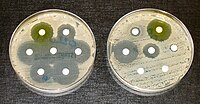
Photo from wikipedia
Abstract Background Early appropriate antibiotic selection is life saving in sepsis. Facility-level antibiograms inform antibiotic selection after pathogen identification and before susceptibility results are available, but only if ≥ 30… Click to show full abstract
Abstract Background Early appropriate antibiotic selection is life saving in sepsis. Facility-level antibiograms inform antibiotic selection after pathogen identification and before susceptibility results are available, but only if ≥ 30 isolates from a given species are tested in the prior year. Stenotrophomonas maltophilia (SM) has a complex resistance profile and is associated with an 8-fold mortality increase. We hypothesized that a regional antibiogram may help inform clinical decision-making for severe SM infections. Methods To generate a regional SM antibiogram, we conducted a cross-sectional, voluntary survey of 2015 cumulative facility-level antibiograms from all hospitals in LA county. Non-respondents were contacted to improve response rates. Isolates from sterile sources were pooled. Susceptibility was aggregated and percent susceptible was calculated only when all isolates were tested, i.e. not reflex testing. To identify optimal combination empiric therapy for SM infections, we generated a combination antibiogram using broth microdilution results from a single tertiary care facility in LA. Results Antibiograms were submitted by 85/100 (85%); 50 hospitals (59%) reported SM (n = 1719 isolates, Table 1). Hospitals commonly (25/50) reported data for <30 isolates. The combination antibiogram for SM is presented in Table 2. Four hospitals reported susceptible results for antibiotics to which SM is intrinsically resistant (ceftriaxone, meropenem, aminoglycosides). After SXT, the most active antibiotics against SM were not routinely tested by the majority of laboratories (minocycline, colistin) (Table 2). Conclusion The LAC regional antibiogram represents one of the largest reports of SM susceptibility presented to date. Hospitals rarely tested sufficient numbers of SM isolates to provide reliable estimates for resistance and failed to report on clinically valuable treatment options. Regional antibiograms may help hospitals with low pathogen prevalence improve antibiotic selection and reduce mortality for uncommon but potentially deadly pathogens. Disclosures L. G. Miller, Sage Products: Study coordination, Conducting studies in healthcare facilities that are receiving contributed product. Xttrium: Study coordination, Conducting studies in healthcare facilities that are receiving contributed product. Clorox: Study coordination, Conducting studies in healthcare facilities that are receiving contributed product. 3M: Study coordination, Conducting studies in healthcare facilities that are receiving contributed product. J. A. McKinnell, Allergan: Research Contractor, Scientific Advisor and Speaker’s Bureau, Consulting fee, Research support and Speaker honorarium. Achaogen: Research Contractor, Scientific Advisor and Shareholder, Research support. Cempra: Research Contractor and Scientific Advisor, Research support. Theravance: Research Contractor, Research support. Science 37: Research Contractor, Salary. Expert Stewardship, LLC: Board Member and Employee, Salary. Thermo Fisher: Scientific Advisor, Salary
Journal Title: Open Forum Infectious Diseases
Year Published: 2017
Link to full text (if available)
Share on Social Media: Sign Up to like & get
recommendations!